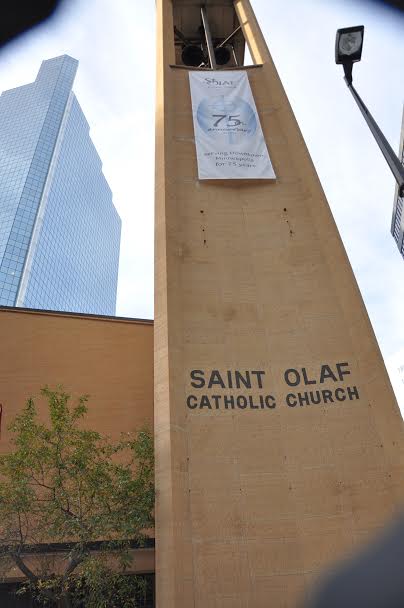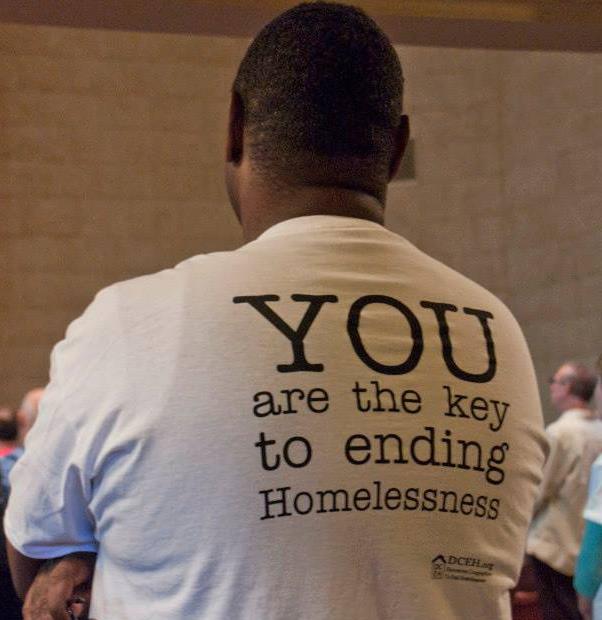Downtown Congregations to End Homelessness (DCEH) - an Interfaith Collaboration of 14 Downtown Churches, Synagogues and Mosques Working Together
 Sunday, December 25, 2016 at 1:16PM |
Sunday, December 25, 2016 at 1:16PM |  Claudia Kittock |
Claudia Kittock | Article by Claudia Kittock
People of faith have long supported people in need and people experiencing homelessness. While government entities have been slower to respond, congregations have always responded. Minneapolis is filled with examples!
The Downtown Congregations to End Homelessness (DCEH) is an interfaith collaboration of 14 downtown Minneapolis churches, synagogues and mosques working together to end homelessness and poverty. They are in the eighth year of existence, and focus on shifting from an immediate needs approach to long-term solutions through a combination of education, advocacy and action.
 Photo credit Rick KittockDCEH is committed to impacting the community around us to end homelessness, and has three overall goals:
Photo credit Rick KittockDCEH is committed to impacting the community around us to end homelessness, and has three overall goals:
The first is organizational. While all the member congregations offer help for people experiencing homelessness, it is helpful to have DCEH coordinate the work and help to avoid duplication of services.
The second goal is providing information to each congregation involved. That information dissemination assists congregants in becoming more involved. Knowledge is power, and knowing what needs to be done is the first step in doing it. Advocacy work begins with knowing what needs to be done and how it needs to happen.
 The third goal is the newest. DCEH has designed a series of talk sessions for people experiencing homelessness called Street Voices of Change. These sessions are to share stories, and to learn how to build community and advocate for the advancement of their circumstances. Homelessness requires tremendous self-advocacy work, and learning to do that at these sessions is expected to be incredibly helpful. Eventually, the hope is that these sessions may also lead to advocating in other arenas in life. People experiencing homelessness are not well represented in advocacy work, and that needs to change.
The third goal is the newest. DCEH has designed a series of talk sessions for people experiencing homelessness called Street Voices of Change. These sessions are to share stories, and to learn how to build community and advocate for the advancement of their circumstances. Homelessness requires tremendous self-advocacy work, and learning to do that at these sessions is expected to be incredibly helpful. Eventually, the hope is that these sessions may also lead to advocating in other arenas in life. People experiencing homelessness are not well represented in advocacy work, and that needs to change.
In 2015, a survey was conducted on one night in October by Wilder Research, which resulted in a count of 9,312 people without a safe and stable home in Minnesota. This is the first decrease (9% from 2012) in the number of people experiencing homelessness since the Great Recession and the Sub-Prime Mortgage collapse.
- 3,296 children were counted with their parents on the night of the survey.
- The average age of children with their parent is 6 and a half.
- The study counted 992 youth (age 21 and younger) on their own, down from 1,151 in 2012; 213 of the youth were age 17 and younger; 779 age 18 through 21.
- Collectively, children and youth under the age of 24 make up 52% of the homeless population.
- 4,108 adults between 21 and 54 were homeless on the night of the count.
- 843 adults over the age of 54 were counted in the survey, which is the fastest growing population of people experiencing homelessness.
- The most common reason (66% of the time) adults age 18 or older left their last housing was due to lack of job security or insufficient income.
- Adults age 18 or older had a median income of $550 during the month of the study, and could afford an average of $387 per month in rent (one in five could not pay anything for rent).
The critical question always comes down to involvement and how to help this group.
1. Please learn about the work DCEH does by visiting the website.
2. Get involved in advocacy work. There is money to address these critical issues, but moneys are allocated based on government decisions, be it city, county, state, or nationally. Get involved and make your voice heard on these issues. Where do you want your tax money spent?
3. If you belong to one of the congregations in DCEH, help with the work.
4. Learn about volunteer opportunities by sending inquiries to the director of DCEH, Joe Kreisman, at joe@dceh.org.
Claudia can be reached at claudia@millcitymedia.org
